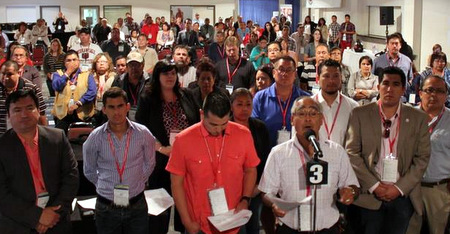Judge Chides Harper Government's 'paternalistic, self serving, arbitrary and disrespectful' approach to First Nations
On January 17, 2014, Justice Patrick Smith of the Specific Claims Tribunal issued his decision in Aundeck Omni Kaning v. Canada, finding that Canada’s unilateral, take-it-or-Ieave-it approach to the resolution of specific claims represents a blatant refusal to negotiate and undermines the Honour of the Crown in its dealings with First Nations.
“The Union of BC Indian Chiefs has carefully reviewed the decision and it is clear it is a damning picture of the Government of Canada’s fundamental lack of respect and commitment to resolving specific claims and bringing about true reconciliation between First Nations and the Crown. Specific claims can only be resolved through meaningful engagement not through abusing the very process of specific claims resolution Canada imposed on First Nations,” stated Grand Chief Stewart Phillip, President of the Union of BC Indian Chiefs. “We stand with the Aundeck Omni Kaning in their efforts hold Canada to account.”
In his decision, Justice Smith observed Canada’s position is:
“frankly, paternalistic, self-serving, arbitrary and disrespectful of First Nations. It falls short of upholding the honour of the Crown, and its implied principle of “good faith” required in all negotiations Canada undertakes with First Nations. Such a position affords no room for the principles of reconciliation, accommodation and consultation that the Supreme Court, in many decisions, has described as being the foundation of Canada’s relationship with First Nations. “
Chief Maureen Chapman, Chair of the BC Specific Claims Working Group commented “We, as First Nations, engaged in Canada’s process to resolve our specific claims because we hoped that Canada would keep its promise to negotiate. To truly resolve these past wrongs, the claims must be heard. There is no place for unilateralism in a process intended to bring about reconciliation. There is no place for bullying and strong-arming when the honour of the Crown is at stake.”
The decision is a scathing critique of Canada’s process for resolving many specific claims – those it unilaterally deems to be of small value. The specific claims process was created to resolve Canada’s past lawful obligations through negotiations and to bring about meaningful reconciliation between First Nations and the Crown.
Since 2008, 86% of claims are now rejected outright or their files are arbitrarily closed (up from 44%). At least 20% of the claims currently under review at the Tribunal are the subjects of file closures as are 30% of claims listed as “concluded” by the specific claims branch.
This story is a press release from The Union of BC Indian Chiefs.


























Comments